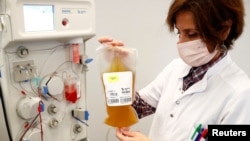The World Health Organization is advising against the use of convalescent plasma to treat patients with COVID-19.
Various studies have been conducted to see whether convalescent plasma — the transfusion of blood plasma from someone who has recovered from COVID-19 — can save the lives of people newly infected with the disease.
The head of the World Health Organization's Clinical Care Emergencies Program, Janet Diaz, says clinical experts in different fields of medicine have issued new guidelines on convalescent plasma based on evidence gathered from 16 clinical trials involving more than 16,000 patients with non-severe, severe and critical COVID-19 infections.
She says some of the studies have shown differing results regarding the efficacy of the treatment.
"But when we look at the totality of the evidence, so not just individual trials but bring it all together, the certainty in the non-severe patients — so those mild patients — is pretty high to moderate that it does not have an important impact on mortality," she said.
As such, she says WHO strongly recommends against the use of convalescent plasma for the treatment of non-severe COVID-19. Current high-certainty evidence, she says, shows it does not result in an important reduction in mortality.
"The second recommendation is a recommendation against the use of convalescent plasma in patients with severe and critical COVID-19 outside of clinical trials," she said. "This is based on low-certainty evidence that convalescent plasma may have little or no impact on mortality."
Diaz notes that uncertainty remains about the potential benefits of convalescent plasma among people who are critically ill with COVID-19. Therefore, she says, the panel of experts thinks it is important to continue clinical trials in the use of this treatment for this category of patients.
Such carefully monitored, ethically structured trials, she adds, would help generate more evidence on the actual effects of this treatment among severely ill patients.
In February, the U.S. Food and Drug Administration scaled back its convalescent plasma emergency use authorization based on the results of clinical trials.




